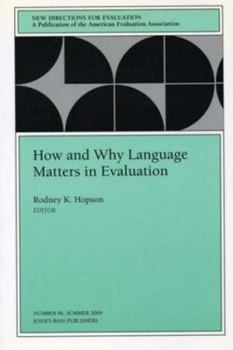How and Why Language Matters in Evaluation: New Directions for Evaluation, Number 86
(Book #86 in the New Directions for Evaluation Series)
While attention to language issues is well accepted in social science research, serious consideration of language in evaluation research and practice has been limited. Yet, say the authors of this volume, significant contributions could be made to the theory, practice, and methods used by evaluators simply by understanding the important relationship between language and evaluation. This issue fills a void in the evaluation literature by illuminating the ways language shapes our understanding of social policies and programs we evaluate. The contributors-drawn from a range of diverse disciplines-consider why and how language is an evaluation issue and outline the conceptual and practical concerns it raises. Drawing from such varied examples as a statewide at-risk youth project, a Quebec welfare program, mixed-sex focus groups, and an urban tuberculosis screening program, the authors provide a balance of conceptual analysis and practical advice that clearly shows how careful attention to language can improve what evaluators do today as well as spark new and thoughtful discussion in the future. This is the 86th issue of the quarterly journals New Directions for Evaluation .
Format:Paperback
Language:English
ISBN:0787954306
ISBN13:9780787954307
Release Date:June 2000
Publisher:Jossey-Bass
Length:115 Pages
Weight:0.80 lbs.
Dimensions:0.3" x 6.0" x 8.9"
Related Subjects
PsychologyCustomer Reviews
0 rating





